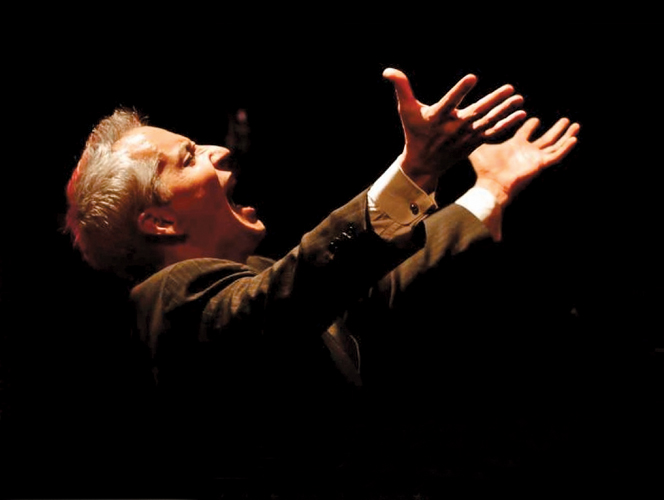
Unity’s Musical Minister

Michael Gott is spiritually in tune.
by Shirley Knight
Michael Gott has gone from being a barefoot schoolboy in rural Oklahoma to being the featured artist in gay piano bars and a minister who travels the world. Along the way he has recorded ten albums, written two musicals, and sung a duet with Billy Joel.
“Music is pre-verbal,” Gott says. “We’re not the only species that sings or has music. It’s a way of connecting and expressing. It’s old and deep in us. It’s transcendent. It moves us out of the mundane parts of life. Music is a powerful tool,” he continues. “It moves the energy around in a room faster than anything else.”
Gott became the pianist in his church at the age of twelve. In high school, there were only forty-three people in his graduating class, and the school was too small to have a choir. “Now I’m grateful for that small-town-America upbringing,” he says, recalling the freedom of being gone on his bike all day. “At the time,” however, “I had a deep sense of inferiority. I knew there was this bigger, broader world out there, and I wanted to be out there in it.”
Gott attended Oral Roberts University, where abstinence with the opposite sex was affirmed and encouraged. Shortly after arriving at the Christian school, however, he fell in love with his first boyfriend. While there, he found “a sort of secret society,” and he remains “incredibly close” to those college friends to this day.
After earning his bachelor’s degree in music and beginning graduate school at North Texas State in Denton, he dropped out and got his first paying gig, which was in a gay piano bar in Dallas. Gott says that in the early nineties there were four or five gay clubs in Dallas, such as Bill’s Hideaway, that formed a circuit for musicians.
From there, Gott moved on to swanky listening rooms such as the Mansion on Turtle Creek. He formed a trio, began touring, recorded albums, and wrote a musical called All Stressed Up with Nowhere to Go. One of his favorite places to play was at Vanessie of Santa Fe, which he calls “the last great American piano bar.”
During this time, Gott was also playing in a hotel where Billy Joel was staying. Joel came in, picked up a CD, and said, “You’re good.” Gott said, “So are you.” Joel later joined Gott at the piano, harmonizing on the song “When You Wish Upon a Star.”
Gott says he makes his best music when he’s most authentic—when he’s conveying “a real experience of emotion in my life. When something comes from a kernel of emotional truth in us,” he continues, “the listener can feel that.”
While playing in a gay piano bar,
Gott was discovered and hired by a
minister from the Center for Spiritual Living in Dallas. “I began a path of personal growth and development,” Gott says, which included recovering from substance and alcohol abuse.
Gott says he resisted the call to the ministry at first because “if you’re on a plane and someone asks what you do, if you say you’re a musician, that’s cool. If you say ‘I’m a minister,’ that’s not cool.” Gott is part of a movement called New Thought, which he says is “for people who are spiritual but not religious.”
As part of this movement, he’s been invited to play in London, Switzerland, the Ukraine, Canada, Mexico, and all over the United States, sharing the stage with best-selling authors such as Deepak Chopra, Marianne Williamson, and Dr. Wayne Dyer.
Since 2011, Gott has been the assistant minister and choir director at Unity Houston, a church he calls “very well known in New Thought circles—iconic, large, and very successful with a diverse congregation.” He directs a service called Wednesday Night Live that he enjoys because it’s casual, relaxed, spontaneous, and only one hour long. “We try to keep the message based in real life,” he says, “so that spiritual principles can be taken up and applied.”
When asked if his sexuality was ever an issue at Unity, he says, “Never. It has about as much relevance as my hair color. I was prematurely gray in my thirties,” he explains, “so it was interesting, and people would talk about it, but it is just part of me being me.”
Gott encourages anyone who has been hurt by religion to find “a spiritual community that affirms who you are. The churches and synagogues and mosques are in need of our gifts,” he says. In Gott’s view, “We’re uniquely gifted, and when we can be our authentic selves, it gives other people permission to be their authentic selves. It’s like ripples on the water. It keeps expanding.”
Gott believes that by coming out, gay people have “caused a cultural shift toward greater acceptance of our differences and greater affirmation of life. We are witnessing a major social transformation driven by gay and lesbian people. We stand in the gap between traditional gender roles, and we get to step out and be in that slightly set-apart place, which can be a really good thing.”
As for future goals, Gott says he would like to develop more relationships between Unity and the community. “I love Houston,” he says. “I love the cultural richness and diversity.
“Unity is a great place to get married,” he adds. “We do the ceremony with love and respect and a deep knowing of its importance, and I look forward to the day when we can do it with legal standing, too.”
Shirley Knight is a founder of The Athena Art Project, a nonprofit community arts organization.











FB Comments